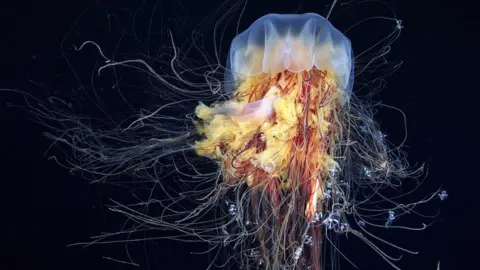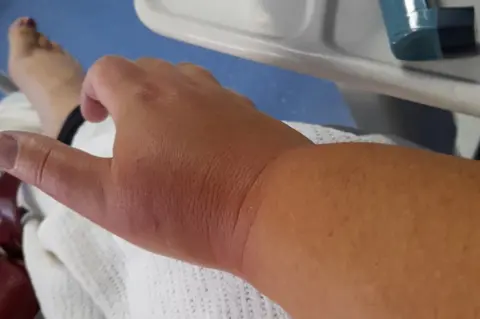Swimmer 'lucky to be alive' after jellyfish sting
 Libby Bligh
Libby BlighA woman says she is lucky to be alive after a jellyfish sting caused an anaphylactic reaction.
Libby Bligh had been swimming with a friend near Ardersier in the Highlands on Saturday when she was stung on her hand by a lion's mane jellyfish.
Within a short time she was left severely unwell and struggling to breathe.
Her friend drove her to hospital in Inverness where she spent 12 hours receiving treatment.
Lion's mane jellyfish are common in UK waters and seen from May until early autumn. Their tentacles can grow up to 3m (10ft) in length and are covered in stinging cells. These are used for catching fish and smaller jellyfish for food.
The jellyfish can give a painful sting. The NHS has information on first aid treatment for stings, and recommends people seek medical advice for swelling or if in severe pain.
 Getty Images
Getty ImagesMs Bligh took up wild swimming in the sea and lochs during lockdown when pools were closed, as it helps with her arthritis.
The social enterprise boss also has asthma and she has suffered anaphylactic reactions in the past after eating crab and lobster. The last time she had a reaction was 15 years ago and she had become accustomed to not carrying emergency treatment everywhere she goes.
On Saturday, she and her friend Agnes had gone swimming at Whiteness beach on the Moray Firth.
It had been a perfect day for a swim with fine weather, calm and crystal clear water and with a seal pup swimming nearby.
The women were returning to shore and watching the seal when Ms Bligh's hand brushed against what she first thought was a mass of seaweed.
Ms Bligh, 50, said: "It turned out to be an absolutely huge lion's mane jellyfish."
 Libby Bligh
Libby BlighShe felt the sensation of having boiling water poured over her arm, but felt well enough to drive her car back to Inverness to seek medical attention at the city's Raigmore Hospital.
Within five minutes, Ms Bligh became ill and she had to stop the car and Agnes took over the driving.
Ms Bligh said: "It felt like the last anaphylactic reaction I'd had. I felt incredibly unwell and had this feeling of impending doom. I was struggling to breathe and when I spoke to Agnes I realised I was wheezing. I was having a full blown anaphylactic reaction.
"Agnes got me to Raigmore A&E just in time as I was struggling to breathe. If it had been a few minutes later I would have stopped breathing.
"If I had been on my own I might not be here to tell the tale."
Ms Bligh was admitted to hospital and put on a course of treatment and kept in overnight. She said the care she received was "amazing".
Doctors have advised that she wear a wetsuit, cap and googles and carry emergency first aid if she goes swimming in the sea again.
Ms Bligh, who hopes her experience serves as a warning to others to be aware of the jellyfish, said: "Anaphylactic reactions to jellyfish are extremely rare and I had no idea I was allergic to them.
"I'm going to stick to lochs until I can save up for a wetsuit."
